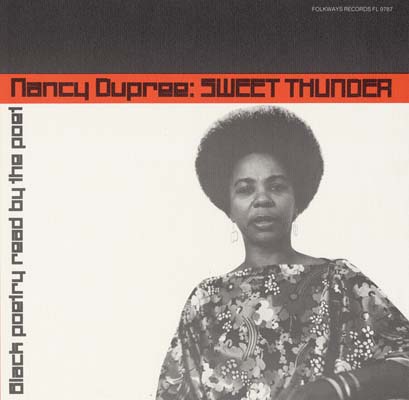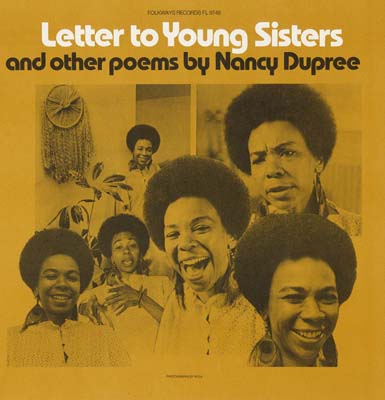NANCY DUPREEE

Soul Poet
by Cat Celebrezze
(February 2018)
Spoken word is a quintessential niche genre - minimal, centered on the human voice, floating somewhere between high literary recitation and religious testifying, it’s poetry removed from the closed, individual experience of words on the page and put into the public performance of the mind. Unlike most other outlier music, there is little or no ephemera to go along with it. It has no distinctive dance. It’s not relegated to a specific geographic region. It doesn’t have unique gear requirements beyond a mic. And though spoken word is unmistakably kin to rap, for the most part, spoken word flies under the radar of popular culture consumption. Except when it doesn’t.
There are those rare occasions when a spoken word artist crosses over into popular consciousness, and when it happens, it’s everywhere. Gil Scott-Heron did it with his zeitgeist anthem “The Revolution Will Not Be Televised.” The Beat Poets, Jack Kerouac and Allen Ginsberg, defined a whole aesthetic era. Ken Nordine managed it with his instantly recognizable growly, snarky, high-modern verse (he also was Linda Blair’s voice coach for the film, The Exorcist). And of course, William Shatner built one of his many second acts as a spoken word artist (if one is being generous with his performance), releasing albums like The Transformed Man wherein he slathered a Shakespearean veneer on to top forty hits to mixed reviews. But beyond this handful of citations, most spoken word artists, whether their work is literary, politically prescient or hideously amateur, remain, like comedians, local heroes of the open mic night.
Nancy Dupree is definitely a local hero - born in Sumter, South Carolina, she eventually found herself teaching grade schoolers in Rochester, New York in 1964. There, she encouraged learning via the lens of the Black American experience, using Odetta, Nina Simone, and Miriam Makeba as touchstones for lessons. But in the late 1960s she also managed to do the impossible for a spoken word artist: land a three-record deal with Folkways Recordings. As legend has it, she accomplished this feat by working the angle hard on a airplane flight where she found herself sitting next to the label’s founder, Moses Asch.1 How she did it is irrelevant, that she did it is a little proof positive that sometimes excellence can’t help but come to light for larger audiences.
I stumbled upon Nancy Dupree in 1993, without even knowing it, on one of my oft-whiled-away Saturday afternoons, flipping through the crates at Magnolia Thunderpussy, a record and CD store in Columbus, Ohio that by some miraculous exception to the rule is still open for business to this day. These weekend field trips were not purchasing expeditions, rather, they were just an opportunity to think about music in all its forms and variations while perusing the endless examples of such in the used CD and LP bins. I might buy something on these outings for only a handful of reasons: 1) I heard it on college radio, 2) it was on a mixed tape a friend gave me, 3) the album art looked interesting, 4) I saw someone who looked way cooler than me in the story buying it, 5) a clerk I trusted recommended it. On one of these afternoons I saw something that fit into the aforementioned reason number 3 and shelled out the seven bucks. It was a used copy of Totally Wired No. 12 - a compilation put out by the London-base Acid Jazz label. On it was a track called "The Swinging Foot" attributed to an entity obliquely called 'The Swinging Foot.' The voice, backed by some nascant jazz scale progressions and punctuated by some high horns, was one of sly southern expressiveness, suggesting a surreptitious understanding between the artist and the audience. It spoke of how “slave descendants can be roughly divided into two groups: those who believe the propaganda... and those who don’t.” The track goes on to explain with a humor both musing and macabre the differences between these two groups and how “it’s the swinging foot that’s gonna bring us together!” For years, I tried to find out more about that voice. The liner notes held no information and in 1993, there was no such thing as “Googling it.” It wasn’t until 2016, while listening to a Spotify play list, that I recognized the voice again and discovered the name, biography, and discography behind the voice as belonging to Dupree, who died of leukemia at 44 in 1980.
Dupree’s Folkways output consists of three albums: Ghetto Reality (1969), Sweet Thunder (1977), and Letter to Young Sisters and Other Poems (1979). The first, Ghetto Reality, holds incredible evidence of her educational passion and teaching skills, with ten tracks of music written by Dupree and lyrics written by her school children. Here we find a revamping and of old standards like "Jingle Bells" and creative homages to heroes meaningful to the children themselves. Highlights include the most energetic and percussive veneration of the Virgin Mary ever cut to wax ("Virgin Mary"); a beautiful, poignant, blues lamentation of the murder of MLK ("Docta King"); an ambling tribute to the Godfather of Soul, complete with “uhs!” and “good gods!” ("James Brown"). Other tracks are ingenious, seeming to succumb to limiting norms and then putting a twist to it, like on "I Want." Here, Dupree and the children harmonize the perennial Christmas question into a humanism rather than consumerism with the boys first asking for a bitchin’ Super B “...powerful, black and beautiful, like me!” and the girls requesting “...a man, I want a black man, just like Malcolm!” followed by the boys wanting “...a one-family house. Plenty heat; and no rats” and the girls demanding “...a mini-skirt. It don’t matter that I weigh 900 pounds.” The liner notes of the album include Dupree’s introductions to each track, telling us how they came to be and where the children found their inspiration (beyond that of the unnamed catalyst of Dupree herself).2 Truth be told, if this was Dupree’s only output, it would be victory enough, a rare instance of institutional learning and collaboration unstinted by the usual racial and gendered repressions that are still far to familiar today. But Dupree subsequently released two more albums of spoken word material.
Many of the tracks on Sweet Thunder are also found on Letter to Young Sisters and Other Poems and both hold intimate recordings of Dupree reading her poetry in a call-and-response atmosphere with an small audience. Whereas Ghetto Reality put front and center the experience of being up a Black kid in the unforgiving streets of Rochester, the two later releases show Dupree expounding on what happens to those children if they survive and try to thrive as Black adults in America. Her words never cut too far from the bone, with portraits both perceptive and humorous, invective and compassionate, gesturing to the rules as she waves at them in her rearview window. "My People" on Sweet Thunder, has Dupree introducing the track with a warning “...that, you know, they talk about proper grammar, and have all due respect for proper grammar, I can proper the grammar any time, any where, any place. However I do not feel that this is the time or the place. I’m going to speak the language the way my people speaks it. Yes I is.” The rest of the poem describes the typical American devaluation and hatred of the Black experience and, with finesse, answers it with the pithy truth of Black survival: “Nuttin to it, but to do it.” On the later track "Herd Runners," Dupree puts both Black and White herd mentality on the examining table, condemning the ignorance that exists beyond the constructs of race. Sweet Thunder’s liner notes 3 show Dupree’s penchant for visualization and the radical experimentation with form normally associated with e e cummings. Not all tracks are stellar - sometimes she bust out in song that I’m sure had more effectiveness live - but whether it’s the words she speaks or the text she writes, Dupree is original, vibrant, and visionary.
Letter to Young Sisters 4 is where you’ll find the original recording of "The Swinging Foot." I still do not tire of hearing her spin this knowledge to the audience. She navigates effortlessly the tones of conversational banter to laughing distain to sincere conviction. Her narrative is confident, complex, tragic and funny (“Other believers be sly with their stuff... the propaganda be gospel truth to them too, but they say one thing to Flossie and something completely different to Congressman Slewfoot”). No one gets a bye in the ring with Dupree. But she won’t leave you long to twist before offering the reprieve of laughter. There are other tracks on Letter that are important, such as the still outrageously and political relevant "Tears" and "Bulletholes" but for me it’s "the Swinging Foot" that shows her brilliant as a poet of both her time and of the future. The interpretation that is on Totally Wired is the one I prefer but why the Acid Jazz label did not credit her properly is something that ought to be fixed.
When it comes down to it, Nancy Dupree, the teacher, the poet, the musician, and Black woman shows us the heart of darkness and light the occupies both our minds and quixotically, devastatingly enough still, America. Give her an ear for listening and she’ll deliver all this but with a rare humility as when she states in the liner notes of Letter, “You are invited to take these poems, fold them neatly, and tuck them away in the corner of your soul reserved for food.”

FOOTNOTES:
1. Chris Taylor. “Old Music: Nancy Dupree and James Brown,” in The Guardian, March 6, 2012. https://www.theguardian.com/music/2012/mar/06/nancy-dupree-james-brown
2. Liner notes for Ghetto Reality https://folkways-media.si.edu/liner_notes/folkways/FW07520.pdf
3. Liner notes for Sweet Thunder https://folkways-media.si.edu/liner_notes/folkways/FW09787.pdf
4. Liner notes for Letter to Young Sisters and Other Poems https://folkways-media.si.edu/liner_notes/folkways/FW09748.pdf
Spotify playlist: https://open.spotify.com/user/gojiracat/playlist/5l1nXkA4yXBhHnxwd3SfEg